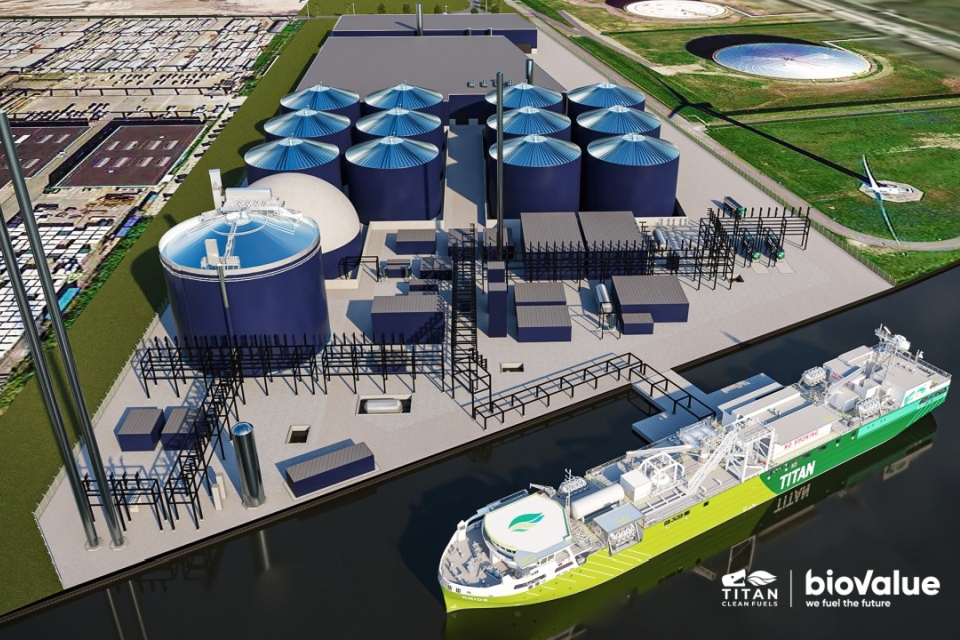Dutch maritime fuel supplier Titan will scale up liquified biomethane (LBM or bio-LNG) production in the Port of Amsterdam together with BioValue as biogas supplier. Linde has been contracted to perform the basic engineering. The plant will be able to supply 200,000 tonnes of bio-LNG a year.
Titan will build and operate the LBM plant at its strategic location in the Port of Amsterdam allowing supply to ships and trucks. Important milestones for the project are the two recent contract signings with biogas producer BioValue for the exclusive off-take of all on-site produced biogas, and with Linde Engineering to perform the basic engineering.
BioValue, one of the largest biogas suppliers in the Netherlands, will supply a significant part of the biogas required for the total LBM production. For this, BioValue will construct a new biogas plant, adjacent to the LBM plant. The remaining biogas will be sourced from other production installations throughout Europe that are connected to the existing gas grid. This hybrid sourcing setup enables the scale required for impactful decarbonisation of the marine industry, says Titan.
Titan has selected Linde Engineering to perform the engineering based on its proprietary liquefaction technology.
Also read: LNG bunkering barge that will service Antwerp region delivered
Bio-LNG-powered vessels
The bulk of the LBM volumes produced by the plant will be supplied to the bio-LNG-powered vessels of Titan’s launching customer. For the remaining volumes truck, refuelling stations and industrial customers are also within scope.
The LBM will substitute fossil fuels and is said to avoid about a million tonnes of CO2 equivalent emissions per year. This is equal to the annual emissions of about 25 per cent of all diesel cars in the Netherlands. The project aligns well with EU regulations such as proposed in the Fit-For-55 package and the recently published RePowerEU plans.
The plant will be located adjacent to Titan’s berth in the Port of Amsterdam, from whom the land will be leased. The first LBM production is expected in 2025.
Also read: Cutter suction dredger Spartacus bunkers LNG for the first time
Sustainable production
Producing LBM in the most sustainable way is a key project target and has been integrated throughout the plant’s design. Importantly, the project will only source biogas from sustainable feedstocks that are compliant with the latest EU Renewable Energy Directive, and are International Sustainability and Carbon Certification (ISCC) certified.
Other sustainable integrations in the plant include the capturing and utilisation of the biogenic CO2 side stream, and the hydrogen-ready design. This enables future production of e-methane where the biogenic CO2 is combined with green hydrogen. For this, a connection to the hydrogen backbone planned in the Port of Amsterdam is envisaged.
‘Titan is committed to decarbonise shipping by supplying LBM and any other renewable fuels such as hydrogen-derived methane, also known as E-LNG,’ says Ronald van Selm, CTO at Titan. ‘Strategic value chain collaborations are paramount to ramping up alternative fuel production to the scale required for shipping.’
Also read: EU funding for LNG bunkering barges in Zeebrugge, Rotterdam and Lübeck








